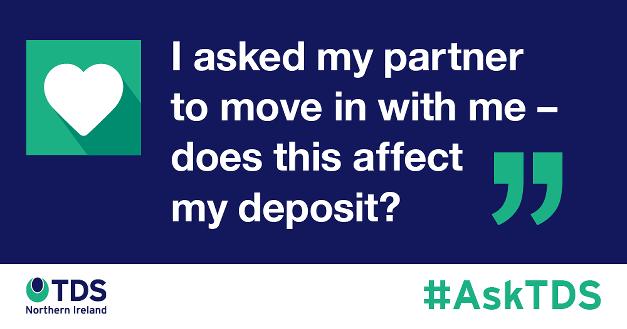#AskTDS: "I asked my partner to move in with me - does this affect my deposit?"

This article has been written in response to a tenant’s query: “I asked my partner to move in with me - does this affect my deposit?"
It was Valentine’s Day on Wednesday and you may have decided to invite your partner to move in with you. If you are a tenant and considering making this move (or have already asked), there are some things you need to bear in mind.
The first thing you should do is speak with your landlord or agent. They are likely to want credit checks and references done on any new tenants. Having done that, the tenancy agreement will need to be updated to reflect the changes.
How will it affect a tenancy deposit?
Having an extra tenant in a property may lead to the landlord or agent increasing the deposit; additional tenants mean more wear and tear – and therefore a greater risk of damage. The new tenants will want to have their interest in the deposit protected, which means updating the deposit protection details.
Apart from new tenants, there may in fact be other parties to think about: was any increase in the deposit paid on behalf of the tenants by somebody else? If it was, they need to be given Prescribed Information because they are a ‘relevant person’ in relation to the deposit.
Of course, the change in tenants will also be relevant to the deposit when the tenancy ends. If the landlord or agent raises a dispute at the end of the tenancy, an adjudicator may approach things differently knowing that the number of tenants has changed. The allowance they make for wear and tear is likely to be higher as the property is receiving more use during the tenancy period.
Remember: You are essentially renegotiating the contract so make sure this is done correctly, ensuring that your landlord or agent has evidence that all parties are in agreement. It is also extremely important that any changes are reflected on the deposit protection. The deposit may have been protected on the first tenancy agreement; but this does not automatically carry protection over to the second replacement agreement, as some of the names will be different. If the information is not updated, this could mean that the deposit for the second tenancy is unprotected.
Tenancy Deposit Scheme Northern Ireland (TDSNI) is a government approved scheme for the protection of tenancy deposits; we offer both insured and custodial protection. We also provide fair adjudication for disputes that arise over the tenancy deposits that we protect.
